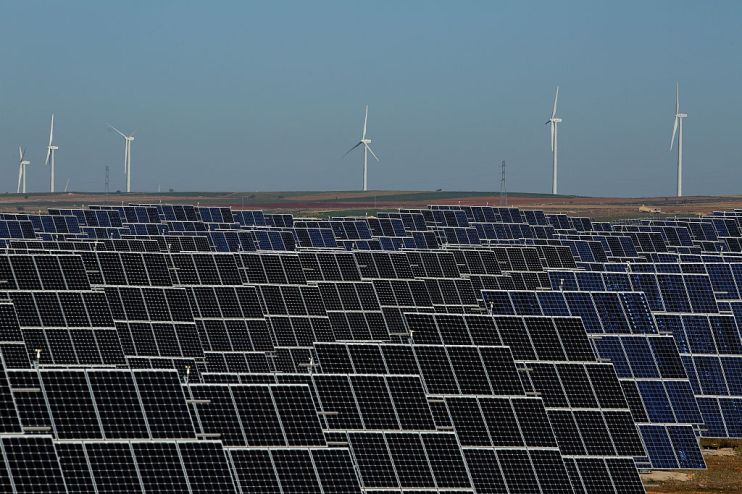‘They have not done anything’: Hunt slammed for failing to back solar energy in Budget

The government should have prioritised ramping up renewables such as solar power instead of pledging £20bn to carbon capture, usage and storage, argued energy bosses, industry bodies and think tanks.
Nigel Pocklington, chief executive of supplier Good Energy told City A.M. that CCUS had a role in the path to net zero, even if it was sometimes used as a “fig leaf for maintaining fossil fuel interests longer.”
However, he criticised the comparative lack of policies and funding in the Budget towards reviving onshore wind and boosting solar power – an increasingly gaping issue with the government targeting a fivefold increase in generation from 14GW to 70GW by 2035 as part of its energy security strategy.
Pocklington said: “What we need to do is double-down on the increase in renewable generation capacity. We could finally do something about the onshore wind conundrum and continue to push for a massive rollout of solar capabilities.”
In particular, he criticised Chancellor Jeremy Hunt for taking credit for “fixing the roof while the sun is shining.”
Hunt told the House of Commons there had been a 90 per cent boost in solar power installations over the past 13 years – even though this is a rate comparable and even below rival developed economies.
“It’s all very good boasting about it, but all the current administration has done is cancel the feed in tariff scheme. They’ve not particularly played a role in what I would say is commercially driven growth. I can’t really put my hands on much detail on solar policy,” Pocklington explained.

Alongside rebuking Hunt, he criticised former Prime Minister Liz Truss’ push for a clampdown on solar farms last year, and Prime Minister Rishi Sunak’s initial hesitancy towards the technology.
Pocklington said: “They have not done anything to encourage solar, and the governing party spent last summer having an election where the two leadership candidates competed to tell everyone how ugly they thought solar panels were. “
Solar panel installations are rising in the UK, with over 16,000 connected to the grid in each of the past two months, according to data from the MCS dashboard.
Good Energy has been installing solar panels as part of its push to encourage a green lifestyle among its customers, with Pocklington revealing he has seen a lot of growth, but it’s not being driven by policy.
Instead, Pocklington argued it is being “driven by a combination of high energy prices and the reduced cost of installation.”
Industry body pushes for grid reform
Meanwhile, industry body Solar Energy UK raised concerns over the lack of policy in the Budget to address creaking nature of the UK’s electricity grid, with a massive boost in electrification and transmission cabling required to reach the country’s energy ambitions.
It described this described as “the biggest impediment to massive private sector investment in larger scale rooftop and ground-mounted solar systems.”
Chief executive Chris Hewett said: “Yesterday’s Budget was out of step with the mainstream trends in the global energy transition, where investment is pouring into solar, wind and energy storage. The Chancellor appeared to conclude ‘Job done on renewables, now we will focus on CCS and nuclear.’ He’s quite wrong. The country is in dire need of public and private investment into reinforcing the transmission and distribution grids.”
| Energy Source | Generation | Target | Target Date |
| Offshore Wind | 12GW | 50GW | 2030 |
| Solar | 14GW | 70GW | 2035 |
| Nuclear | 7GW | 24GW | 2050 |
| Hydrogen | <1GW | 10GW | 2030 |
He warned the slow pace of upgrading the grid is pushing the expected completion of key solar projects well into the next decade.
Hewett further warned the sector was “suffering from having no investment allowance under the Electricity Generator Levy” in contrast to the “benefits showered on the oil and gas industry” as part of the windfall tax.
Environmental think tank Green Alliance has also raised questions over the lack of reforms to the investment climate.
Stuart Dossett, senior policy adviser, said: “Oil and gas companies have an investment allowance in the windfall tax, renewables don’t in their profits levy. We can and should be building renewables quickly to bring down energy bills, increase energy security and achieve net zero.”
When approached for comment, a Department for Energy Security and Net Zero spokesperson said: “Solar is a UK success story, with over 99 per cent of the UK’s solar PV capacity deployed since 2010 and over a million homes with solar PV installed.
“The government has set the expectation for a fivefold increase in solar deployment by 2035. We are supporting this through a range of measures including a new capital allowance scheme, which will apply to solar technologies, announced this week in the Budget.”